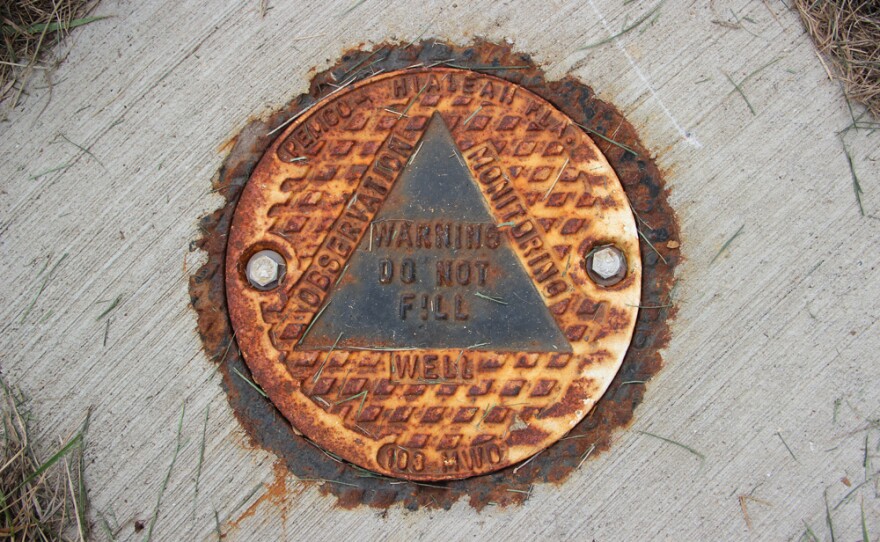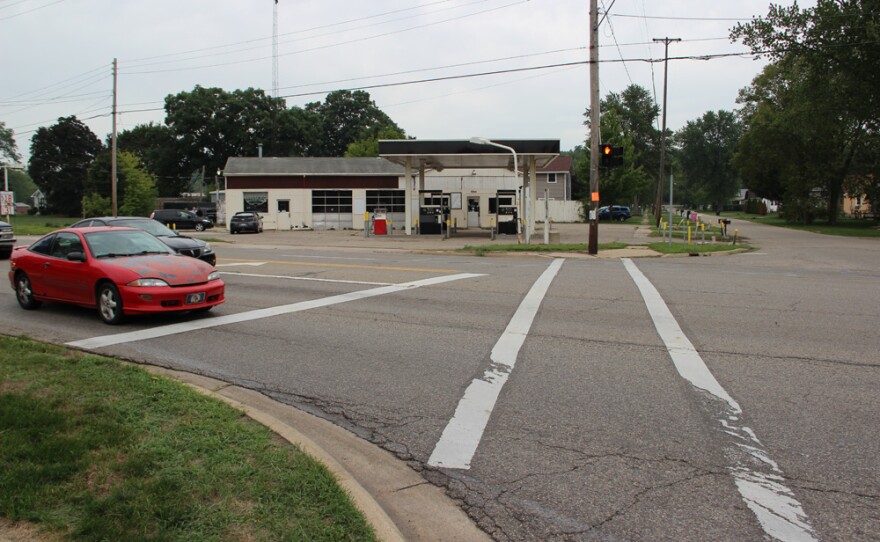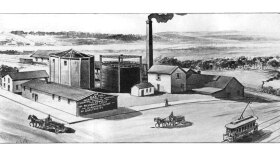There are around 4,800 gas stations in Michigan, but at one time, there were a lot more. It seemed like just about every corner had a gas station on it.
Many of those gas stations are closed now, but taxpayers are often on the hook for what’s been left behind.
I visited one of these polluted sites recently with representatives from the Michigan Department of Environmental Quality (MDEQ). The heavy traffic along State Route 89 near Battle Creek makes it a perfect place for a gas station.
And for a long time, things were going well for Logan’s Gas and Deli.
8,000 gallons of gas dumped in one weekend
But one morning the owner came in to check his inventory, and things were a little off.
Steve Beukema is a Senior Environmental Quality Analyst with the Michigan Department of Environmental Quality.
%22In%20the%20course%20of%20a%20weekend%20they%20lost%20about%208%2C000%20gallons%20of%20gasoline.%20They%20came%20to%20work%20on%20a%20Monday%20and%20their%2010%2C000%20gallon%20tank%20was%20empty%2C%22%20said%20Beukema.
"In the course of a weekend they lost about 8,000 gallons of gasoline. They came to work on a Monday and their 10,000 gallon tank was empty," said Beukema.
Beukema is the project manager for the clean-up at this site near Battle Creek. He says when they pulled the tank, they found a dime-sized hole on the bottom.
Gas spread through the sandy soil underground, across the street, and under a house and a nearby pizza restaurant. Both get their water from underground wells.
Beukema says the owner tried to clean up the mess, but the insurance company wasn’t paying the bills fast enough.
The clean-up contractor walked away after they weren’t getting paid, and the gas station went belly up.
So that’s when you and I step in. We pay an extra fee at the gas pump that helps pay for this kind of clean-up.
Beukema showed me their clean-up system.
It uses a series of high pressure valves that force air underground. The air pushes the gas vapor upward.
"And the other part of the system is a soil vapor extraction, that's essentially like a big vacuum cleaner. It'll suck up all the gasoline vapors from the soil," said Beukema. "It took about $500,000 to install it and another maybe $100,000 to design it. And we have to spend operating and maintenance fees to keep it up and running."
Beukema said they expect to be done with clean-up in the next couple of months, but they’ll be monitoring this site for years to come.
Altogether this clean-up will cost more than $1 million.
Luckily, the underground drinking water wells were not affected here.
Slow underground leaks
This site is an extreme case. Beukema, who is in charge of more than 200 underground clean-up sites in Calhoun Co. alone, said most leaks at gas stations don't happen so quickly. They typically leak slowly; over long periods of time.
Owners sometimes won’t know they’ve had a leak until they go to replace their tank.
These kinds of slow underground leaks have affected drinking water supplies and surface water in Michigan, and there have been a lot of leaks in the state.
Today, there are more than 9,000 documented leaks that still need to be cleaned up. Most of these tanks are not actively leaking, but the pollution remains.
In the U.S., only Florida has more open clean-up cases.
(You can see a map of the open "Leaking Underground Storage Tank (LUST) sites in Michigan from Circle of Blue.)
Around half of the 9,000 sites in Michigan are known as "orphan" sites. The original polluters can't be found, or they can't or won't pay for them.
Michigan clean-ups stall
So it falls back to the state to clean them up, but clean-ups in Michigan have stalled. In the late 1990s, more than a thousand of these sites would be cleaned up every year. Last year, only 171 sites were cleaned up.
(Check out this graph from Bridge Magazine.)
Mark Griffin is with the Michigan Petroleum Association.
"You could not find a more inefficient, stupid way to run a clean-up program," said Griffin.
%22You%20could%20not%20find%20a%20more%20inefficient%2C%20stupid%20way%20to%20run%20a%20clean-up%20program%2C%22%20said%20Griffin.
He blames a lot of bureaucratic red tape and moving clean-up targets from the DEQ for the slowdown.
"It was a moving target. I heard that over, and over, and over again. And I heard it, interestingly, most loudly, from the majority of the folks who do environmental clean-up, the consultants themselves," said Griffin.
Griffin and others also told me that a lack of funding is also to blame for slowing down the clean-ups.
In Michigan, there’s a 7/8 cent fee on each gallon of gas that goes into the "Refined Petroleum Fund."
That fund was originally set up to help clean-up leaks when gas stations replaced their underground tanks, but with the recent tight budget years, that fund has been raided for other purposes.
"I believe $10-15 million a year during the Granholm administration was siphoned off to the Department of Treasury to pay quality of life bonds," said Griffin.
And the fund is still being diverted under the Snyder Administration.
The House Fiscal Agency published a report showing how the fund was spend in FY 2009/10.
The money has been used to pay for things like rent, information technology, and fish monitoring programs.
The 7/8 of a cent that we pay on each gallon of gas generates around $50 million a year for the Refined Petroleum Fund.
But in recent years, only $20 million of that has been put toward cleaning up these leaks. (The Snyder Administration did request that $30 million go toward clean-up in the next fiscal year, but James Clift of the Michigan Environmental Council says it remains to be seen how that money will be spent.)
Changes coming?
This summer, the legislature passed a series of bills aimed removing a lot of the red tape in the clean-up program.
The legislation also set up an advisory board that will take a look at how the money in the Refined Petroleum Fund is spent.
Anne Couture is Acting Division Chief at MDEQ's Remediation Division.
She believes the advisory board will see the importance of returning this money to its original purpose. So that places like Logan's Gas and Deli can be cleaned up more quickly.
%22...we%20do%20need%20to%20use%20this%20fund%20to%20help%20owners%20and%20operators%20who%20don%27t%20have%20the%20financial%20wherewithal%20to%20manage%20these%20sites...%22%20said%20Couture.
“Not only do we need to use this fund to help orphan sites, but we do need to use this fund to help owners and operators who don’t have the financial wherewithal to manage these sites so that we can get to closure, prevent the kind of thing that happened here. Prevent contamination of people’s wells and drinking water,” said Couture.
The state estimates it would cost around $1.8 billion to clean up the more than 9,000 contaminated sites around the state. So even if all the gas fee money went towards clean up. It would take decades to tackle the backlog.




















